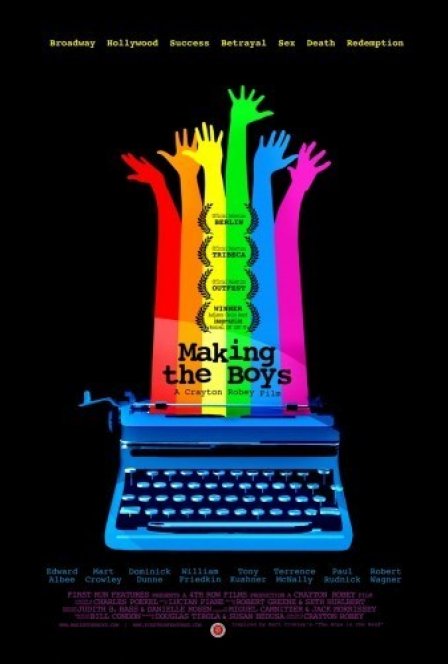Making the Boys, Crayton Robey’s latest documentary, gets at an idea I have always found absolutely fascinating: the remarkable and sometimes devastating effect of rapidly changing cultural context on a work of art. When The Boys in the Band came out (ha!) in 1968, it was lauded as a truly earth-shattering, landmark off-Broadway production. Here was a play that actually treated gay men as if they were human beings with troubling emotional cores and real, relatable concerns, instead of cardboard cutouts who either provided over-the-top comic relief or killed themselves — or both. Upon its debut, the play quickly became one of the most talked about shows in that decade, and its author, Mart Crowley, was celebrated as a hero creating much needed dramatic awareness of civil rights for homosexuals.
However, after the Stonewall riots, which broke out in June 1969, both The Boys in the Band and Crowley became pariahs, symbols of campy excess and clichéd expressions of the “gay lifestyle.” Particularly despised was the role of Emory, a flamboyant interior decorator whose actions and dialogue totally fit the mold of what square America figured all homosexual men must be like. After the gay rights movement started acting in earnest, it became untenable to consider yourself a serious supporter of civil rights and admit publicly to enjoying the campiness of Emory’s character, regardless of how funny his lines actually were. A year later, when William Friedkin filmed a version of the play featuring the same off-Broadway cast, a majority of mainstream film critics of its day gave the film good reviews. Nonetheless, even amidst such critical acclaim, Mart Crowley’s days as a cause célèbre in his own community had come to a definitive end.
Following its meteoric rise and subsequent lickety-split fall from grace, The Boys in the Band has remained a stalwart cult classic, which, to be completely fair, hasn’t aged well. Where Making the Boys triumphs is in the candid portrait it renders of Mart Crowley, who far from being glorified spends a decent amount of the documentary going over the shallow and escapist lifestyle he led after being shunned by the dramatic community. In interviews with him, and with such dignified playwrights as Edward Albee, Tony Kushner, and Terrence McNally, it becomes clear just how much he owed the success of his play to Albee’s Who’s Afraid of Virginia Woolf?, a work which he pretty much ripped off, something about which Albee still evidently harbors some resentment. It is also Albee who cuts to the heart of what so many people found dreadful about The Boys: by creating flawed and human but ultimately petty characters, Crowley, in his own small way, further entrenched the mainstream view that gay men were, at the very center of their being, selfish and insulting creatures.
The film does suffer quite a bit from many superfluous gay celebrity interviews that it could very well have clipped. I mean, do you really want to see Christian from Project Runway make lame jokes about a piece of art he’s never even heard of and how he hopes his ignorance of which doesn’t make him a “bad gay,” or would you prefer to further explore the ambivalence that Albee still grapples with when asked about Crowley’s only real dramatic achievement? Is it of the utmost importance to hear Carson Kressley wax pseudo-sociopolitical about the importance of a play that was shunned completely by the community that it sought to dignify, the gaucheness of its execution notwithstanding? I dunno. Maybe.
With some notable exceptions, Making the Boys is a very well made documentary about a not-so-well made work of art that continues to inspire and baffle its audience, a play which in its first year of existence achieved the status of what Edward Guthmann called “Uncle Tomism.” It is a fascinating exploration of context, critique, and creative failure. I just wish it had a bit more substance and a bit less Dan Savage.

